In the precise and demanding field of geotechnical drilling, the geotechnical core bit is the crucial interface between the power of the drilling rig and the unknown subterranean environment. The success of any site investigation, whether for foundation design, slope stability analysis, or mineral exploration, hinges on the quality of the core sample retrieved. This quality, along with the operational efficiency and the overall project economics, is directly dictated by the performance, durability, and technological sophistication of this single, vital component. At ROCKCODE, we understand this profound connection. This article briefly introduces geotechnical and explain why ROCKCODE is a quality choice.
What is a Geotechnical Core Bit?
A geotechnical core bit is a cutting tool that forms part of the rotary drilling assembly in geotechnical surveys. Its primary objective is to obtain undisturbed, cylindrical core samples of the ground. "Geotechnical drill bits are cutting tools which are part of the rotating perforation battery... which objective is to obtain core samples of the ground"[1].
A typical drill bit is a hollow, cylindrical steel body featuring:
-
Slots or Waterways: These allow coolant (usually water) to flow, which cools the bit, removes cuttings from the hole, and reduces friction.
-
A Matrix: The main body of the bit, often made from powdered metal alloys.
-
The Cutting Medium: This is the super-hard material, either tungsten carbide or diamond, embedded in the matrix that does the actual cutting.
During operation, the rotation of the drill string, powered by a drilling rig (or "probe"), combined with the cutting action of the bit, allows it to penetrate the formation. The resulting cylindrical rock or soil core is then captured inside the hollow barrel and retrieved for analysis.
Types of Geotechnical Core Bits
Selecting the correct core bit is paramount and depends entirely on the ground conditions. They fall into several main categories:
1. PDC (Polycrystalline Diamond Compact) Bits:
Construction: These bits use larger, cylindrical-shaped cutters. Each cutter consists of a layer of micron-sized synthetic diamond particles fused together (the polycrystalline table) that is mounted on a tungsten-carbide substrate.
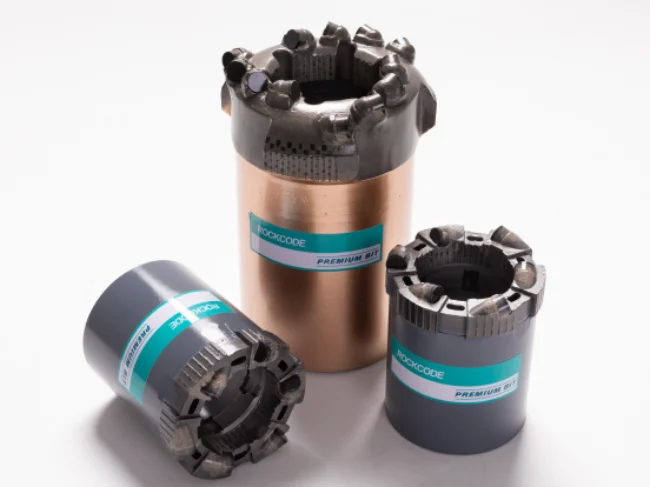
Application: Geotechnical PDC bits are recommended for use when drilling relatively soft, abrasive, unconsolidated sedimentary formations that are not effectively drilled by surface-set diamond bits. The formation types may range from very soft clay, gypsum, or talc to harder types of sandstone. The key to their performance lies in their aggressive shearing action. The difference between various PDC bit designs is often in the degree of cutter exposure and the density (or number) of cutters mounted on the face of the bit, which are optimized for specific formation hardness and stickiness.
2. TSP (Thermally Stable Polycrystalline) Bits:
Construction: These bits use smaller, geometrically shaped cutters (triangular, cubic, etc.) that are composed entirely of leached synthetic diamond particles. This leaching process removes the cobalt catalyst, making the diamond layer thermally stable at much higher temperatures than PDC cutters.
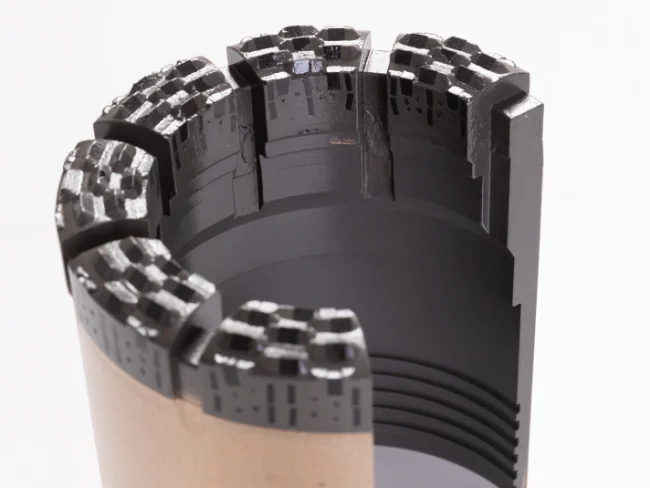
Application: TSP bits bridge the gap between PDC and impregnated diamond bits. Their superior thermal stability makes them suitable for drilling harder, more abrasive formations where standard PDC cutters would fail, and they often offer faster penetration rates than impregnated bits in certain medium-to-hard rock layers.
3. Tungsten Carbide (Vidia) Bits
Construction & Application: These bits with brazed carbide inserts are ideal for unconsolidated soils, clay, and soft rocks. They are particularly effective when drilling very soft or granular formations. A key additional application is milling steel debris in existing boreholes, where their toughness is essential for cleaning out obstructions.
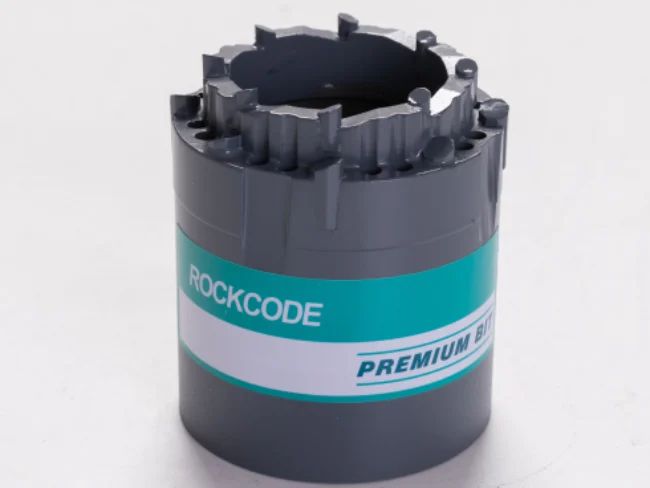
Why choice ROCKCODE
At ROCKCODE, we are committed to produce high-quality geotechnical core bits with premium services.
• Premium Raw Materials: ROCKCODE sources tungsten powders and PDC from global leaders. This ensures its consistent quality and reliable performance from the very beginning stage.
• Rich Manufacturing Experience: With over 10 years of production and extensive geological exploration data, ROCKCODE continuously improves its formulations and processes. eg. TSP type and PDC type. Enhanced production efficiency allows ROCKCODE to provide high-quality geotechnical core bits with greater cost-effectiveness.
• Custom Design Capability: Our technical team can independently design and customize coring and non-coring bits to meet specific geological formations and client requirements, delivering tailored drilling solutions. eg. semi-round PDC bits; PDC Elongated face discharge bits
• Technical Consultation: ROCKCODE is pleased to provide professional advice on bit selection, application, and drilling optimization to help you improve efficiency and reduce operational costs.
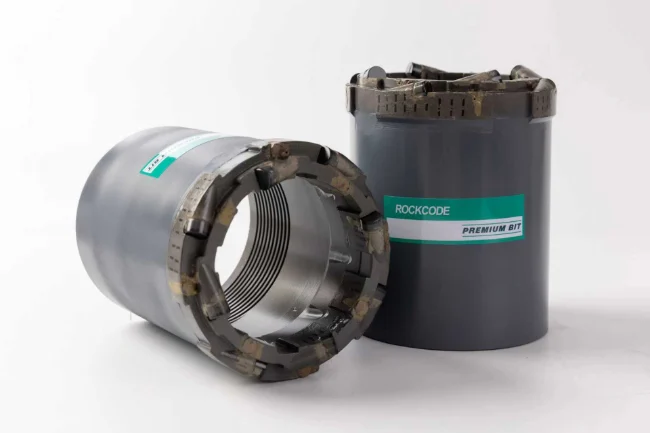
GEOB S φ8X13mm PDC X8 φ10X25mmTCIX8 Core Bit
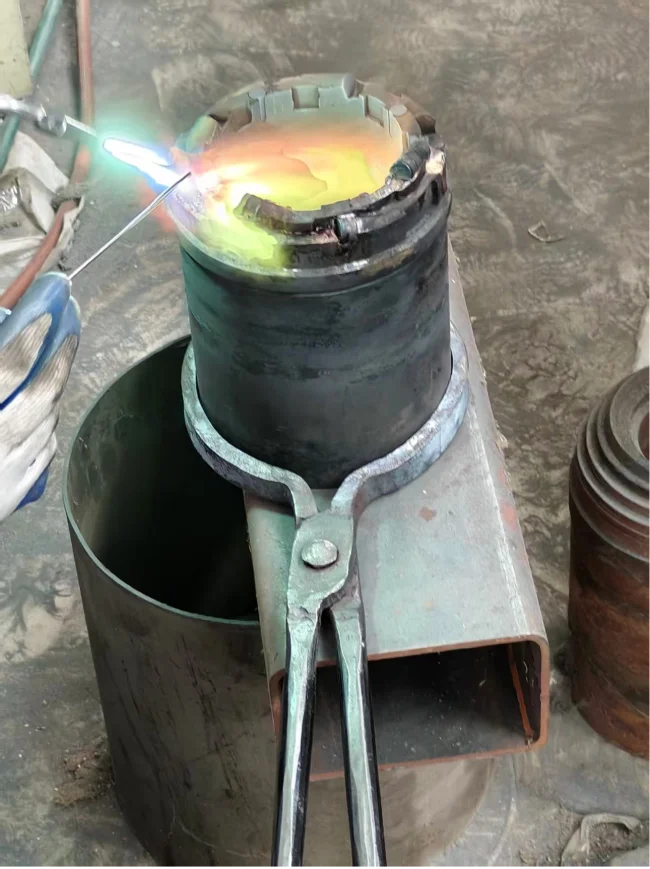
Silver brazing: PDC segments are brazed onto the bit body
At ROCKCODE, we have established a quality management system aligned with ISO 9001:2015, applying the PDCA (Plan–Do–Check–Act) cycle and risk-based thinking to ensure product reliability, process consistency, and continual improvement.
PDCA Cycle Framework
|
Phase |
Description |
|
Plan |
Define quality objectives, identify risks and opportunities, and plan resources and processes. |
|
Do |
Execute R&D, procurement, production, inspection, and service activities as planned. |
|
Check |
Monitor quality performance, conduct internal audits, and evaluate customer feedback. |
|
Act |
Continuously improve system effectiveness through data analysis and management review. |
This structured approach enables ROCKCODE to enhance efficiency, ensure compliance, and deliver high-quality drilling tools that meet customer expectations.
Key Control Points
1. Raw Material Control
ROCKCODE selects premium global suppliers such as Kennametal, Sandvik, and Element Six, and establishes strict incoming inspection standards to ensure consistent material quality.
2. Process Quality Control
Critical manufacturing processes, including sintering, brazing, and diamond setting, are closely monitored to maintain uniformity and performance across all production stages.
3. Inspection & Verification
Precision instruments are used to perform comprehensive or sampling inspections on dimensions, hardness, and bonding strength, ensuring every product meets specification.
4. Customer Feedback Mechanism
Feedback from ROCKCODE’s clients is regularly collected and reviewed to build a closed-loop improvement system that drives better service and satisfaction.
5. Continual Improvement
Through data-driven analysis and management review, ROCKCODE continuously optimizes design, manufacturing, and quality processes to ensure lasting reliability and excellence.
→ For more information about ROCKCODE’s Geotechnical Core Bits, please visit: https://www.rockcodebit.com/geotechnical-core-bit.html
→ Email us at: info@rockcodebit.com
→ Information in this article is for general reference only. For specific drilling projects and drilling bits, please consult qualified professionals. Thank you.
Sources
[1] Geotechnical Drill Bits: https://www.youtube.com/watch?v=tRGXFecntfA
https://www.rockcodebit.com/geotechnical-core-bits-guide.html












Comments (0)